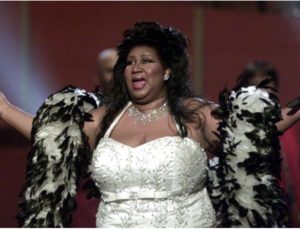Tag: Aretha Franklin music’s ‘Queen of Soul dies at 76
Aretha Franklin music’s ‘Queen of Soul dies at 76

Aretha Franklin, whose exceptionally expressive singing about joy and pain and faith and liberation earned the Detroit diva a permanent and undisputed title — the “Queen of Soul” — died Aug. 16 at her home in Detroit. She was 76.
Her representative Gwendolyn Quinn confirmed the death to the Associated Press and said the cause was pancreatic cancer.
One of the most celebrated and influential singers in the history of American vernacular song, Ms. Franklin reserved her place on music’s Mount Rushmore in the late 1960s and early 1970s by exploring the secular sweet spot between sultry rhythm-and-blues and the explosive gospel music she’d grown up singing in her father’s Baptist church.
The result was potent and wildly popular, with defining soul anthems that turned Ms. Franklin into a symbol of black pride and women’s liberation.
Her calling card: “Respect,” the Otis Redding hit that became a crossover smash in 1967 after Ms. Franklin tweaked it just so (a “sock it to me” here, some sisterly vocal support there), transforming the tune into a fervent feminist anthem.
“Whenever women heard the record, it was like a tidal wave of sororal unity,” the song’s producer, Jerry Wexler, said two decades after Ms. Franklin first declared, “R-E-S-P-E-C-T, find out what it means to me.”
Twenty of her singles topped Billboard’s R&B chart and more than 50 reached the R&B Top 10 over a six-decade recording career during which she earned volumes of praise for her innovative and emotive vocal performances, even when the material didn’t quite measure up to her talents.
A graceful mezzo-soprano stylist, Ms. Franklin had remarkable range, power and command, along with the innate ability to burrow into a lyric until she’d found the exact coordinates of its emotional core.
“She just bared her soul, she exposed herself, she did everything but get on the floor and scream and cry,” singer Natalie Cole told VH1. “She just had that special something that people respond to.”
“I don’t know anybody that can sing a song like Aretha Franklin,” Ray Charles once declared. “Nobody. Period.”
She was at once a brilliant technician and a master emoter, a devastating combination that was unleashed on hits ranging from the swaggering “Chain of Fools” and the cooing “Baby, I Love You” to the pleading “Do Right Woman, Do Right Man” and the fiery, finger-wagging, “Freedom!”-chanting “Think,” another of Ms. Franklin’s feminist anthems that gave unprecedented voice to black women in particular.
In Ms. Franklin’s music, the politics were mostly personal, even when she sang about being “Young, Gifted and Black.” But through the profundity and ubiquity of her songs, she became the multi-octave voice of the civil rights movement, performing at rallies staged by the Rev. Martin Luther King Jr., a family friend — and, later, at King’s funeral.
As one measure of her influence, comedian and civil rights activist Dick Gregory observed of Ms. Franklin’s radio presence: “You’d hear Aretha three or four times an hour. You’d only hear King on the news.”
She sang gospel truths that resonated across age groups, but it was grown-up music, reflecting an adult sense of self-awareness and sexual maturity and full of hard realities to which she seemed to relate.
“If a song’s about something I’ve experienced or that could’ve happened to me, it’s good,” she told biographer Mark Bego. “But if it’s alien to me, I couldn’t lend anything to it. . . . I look for something meaningful. When I go into the studio, I put everything into it. Even the kitchen sink.”
In 1968, at the apogee of her career when she was in her mid-20s and recording soul classic after soul classic on Atlantic Records, Ms. Franklin explained: “Soul to me is a feeling, a lot of depth and being able to bring to the surface that which is happening inside, to make the picture clear. Many people can have soul. It’s just the emotion and the way it affects people.”
Long before she abruptly and mysteriously canceled a half-year’s worth of performances and appearances in November 2010 (doctor’s orders were cited, but no details about her ailments were offered), Ms. Franklin’s health had been a source of concern, mostly because of the considerable weight she was carrying.
When she resurfaced in 2011 for a brief concert tour, just months after announcing that she was undergoing an unspecified surgical procedure, Ms. Franklin told AARP magazine that she’d shed 85 pounds. She attributed the change to diet and exercise but steadfastly denied that she’d had gastric-bypass surgery — and also that she’d had pancreatic cancer. Ms. Franklin did not divulge additional details.
If she was concerned with body image before the weight loss, it didn’t show. Sometimes, she’d wear tube tops and leotards onstage, as if to flaunt her girth. In her later years, she favored strapless gowns and was known to slap her ample backside during her infrequent concerts.
READ MORE AT THE WASHINGTON POST


